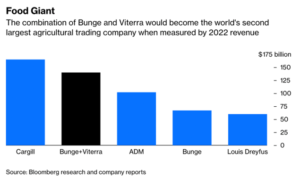
By Agrin Ayhan, Student at King’s College London
The recently announced acquisition of Viterra by global crop merchant Bunge is a monumental shake-up within the global agricultural commodities sector. With an agreement sealed at $8.2 billion, this merger will establish an agricultural titan on par with industry giants such as Cargill and Archer Daniels Midland. This transformative move reshapes the dynamics of the grain and oilseed markets and signals a strategic consolidation in the industry.

Source: Bloomberg Opinion
Since Greg Heckman took the helm as CEO in 2019, Bunge has been methodically reinvigorating its balance sheet, reducing debt, and divesting underperforming assets. Concurrently, earnings and returns improved, setting the stage for an ambitious acquisition. The Viterra deal has arrived as the fruit of this labour, with the resulting entity expected to hold commanding sway over the global agricultural commodities sector.
Strategically, the merger is a masterstroke. Bunge is the world’s leading oilseed processor, and Viterra is a significant grain buyer and exporter. The union of these two will usher in an era of vertical integration within the sector, generating potential cost savings and capitalizing on the synergy of their complementary assets.
The timing of the merger is opportune. The commodities market has been experiencing a boom, fuelled in part by rising demand for renewable diesel and price surges in oilseeds and grains precipitated by geopolitical conflicts. Both Bunge and Viterra have been beneficiaries of these trends, their bumper profits reflecting the favourable market conditions.
For Viterra shareholders, which include Glencore, Canada Pension Plan Investment Board, and British Columbia Investment Management Corp, the deal presents a lucrative cash-in opportunity. They stand to gain around $6.2 billion in Bunge shares and $2 billion in cash, all the while retaining control of a third of the merged company’s stock.
In terms of market positioning, the Bunge-Viterra merger will substantially amplify the combined group’s presence in critical food-supplying regions such as Canada and the US. This development will build on Bunge’s historical status as the “B” in the so-called ABCD of global grain trading companies, connecting farmers with food importers.
Beyond market dominance, the merger will also confer resilience in the face of external environmental changes. As Heckman noted, the combined geographic spread and crop diversification would offer a measure of insulation against potential disruptions such as climate change-induced droughts.
However, the merger could face regulatory hurdles. Given the potential for reduced competition in buying farmers’ crops, antitrust scrutiny from governments in the US, Brazil, Argentina, and China is expected. If navigated successfully, the deal could deliver around $250 million of pre-tax cost savings annually within three years of its completion.
In conclusion, the Bunge-Viterra merger signifies a calculated strategic move in the agricultural commodity markets, a nod to consolidation, and a pragmatic response to external market trends. By combining complementary strengths and seizing the market zeitgeist, the merged entity stands to redefine the competitive landscape of the grain and oilseed markets. The coming years will reveal the full impact of this merger on the global agricultural commodities market, potentially heralding a new era of dominance and resilience in the sector.

Agrin Ayhan
Agrin is a second-year mathematics undergraduate student at King’s College London, graduating in 2024. Along with being on the university fencing and swimming team, Agrin enjoys researching commodities and natural resources. In his spare time, Agrin likes collecting Soviet-era classical vinyls and perfecting his method of pouring a pint of Guinness.